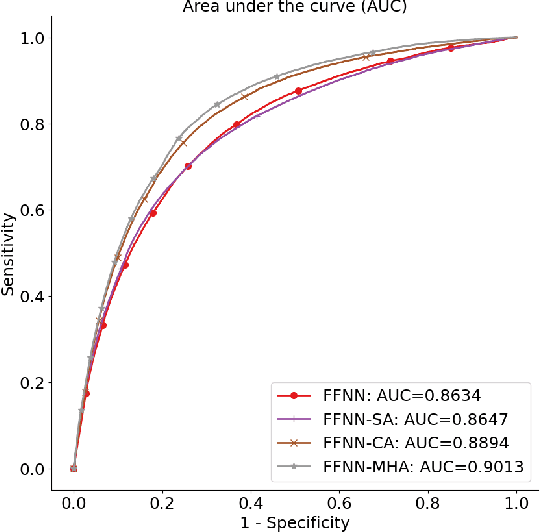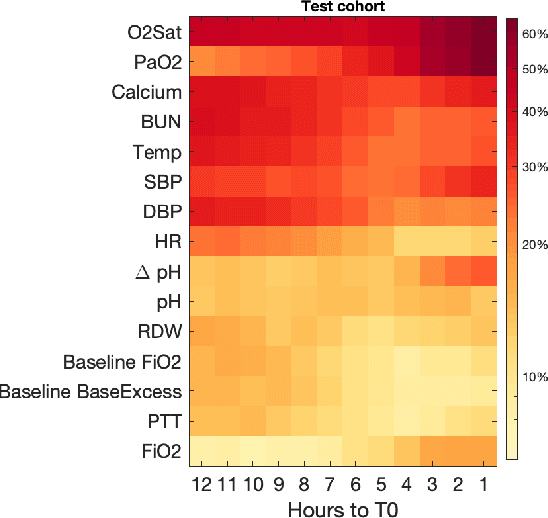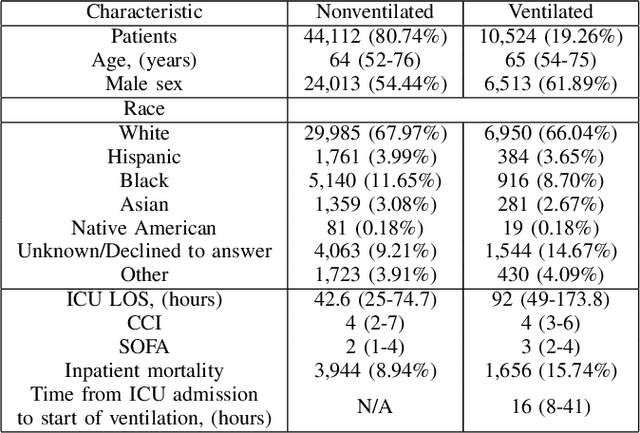Anwesh Mohanty
Improving Prediction of Need for Mechanical Ventilation using Cross-Attention
Jul 21, 2024



Abstract:In the intensive care unit, the capability to predict the need for mechanical ventilation (MV) facilitates more timely interventions to improve patient outcomes. Recent works have demonstrated good performance in this task utilizing machine learning models. This paper explores the novel application of a deep learning model with multi-head attention (FFNN-MHA) to make more accurate MV predictions and reduce false positives by learning personalized contextual information of individual patients. Utilizing the publicly available MIMIC-IV dataset, FFNN-MHA demonstrates an improvement of 0.0379 in AUC and a 17.8\% decrease in false positives compared to baseline models such as feed-forward neural networks. Our results highlight the potential of the FFNN-MHA model as an effective tool for accurate prediction of the need for mechanical ventilation in critical care settings.
FRIDA -- Generative Feature Replay for Incremental Domain Adaptation
Jan 11, 2022



Abstract:We tackle the novel problem of incremental unsupervised domain adaptation (IDA) in this paper. We assume that a labeled source domain and different unlabeled target domains are incrementally observed with the constraint that data corresponding to the current domain is only available at a time. The goal is to preserve the accuracies for all the past domains while generalizing well for the current domain. The IDA setup suffers due to the abrupt differences among the domains and the unavailability of past data including the source domain. Inspired by the notion of generative feature replay, we propose a novel framework called Feature Replay based Incremental Domain Adaptation (FRIDA) which leverages a new incremental generative adversarial network (GAN) called domain-generic auxiliary classification GAN (DGAC-GAN) for producing domain-specific feature representations seamlessly. For domain alignment, we propose a simple extension of the popular domain adversarial neural network (DANN) called DANN-IB which encourages discriminative domain-invariant and task-relevant feature learning. Experimental results on Office-Home, Office-CalTech, and DomainNet datasets confirm that FRIDA maintains superior stability-plasticity trade-off than the literature.
Behavior of Keyword Spotting Networks Under Noisy Conditions
Sep 15, 2021



Abstract:Keyword spotting (KWS) is becoming a ubiquitous need with the advancement in artificial intelligence and smart devices. Recent work in this field have focused on several different architectures to achieve good results on datasets with low to moderate noise. However, the performance of these models deteriorates under high noise conditions as shown by our experiments. In our paper, we present an extensive comparison between state-of-the-art KWS networks under various noisy conditions. We also suggest adaptive batch normalization as a technique to improve the performance of the networks when the noise files are unknown during the training phase. The results of such high noise characterization enable future work in developing models that perform better in the aforementioned conditions.
* 11 pages, 5 figures, Published in Lecture Notes in Computer Science book series (LNCS, volume 12891)
 Add to Chrome
Add to Chrome Add to Firefox
Add to Firefox Add to Edge
Add to Edge